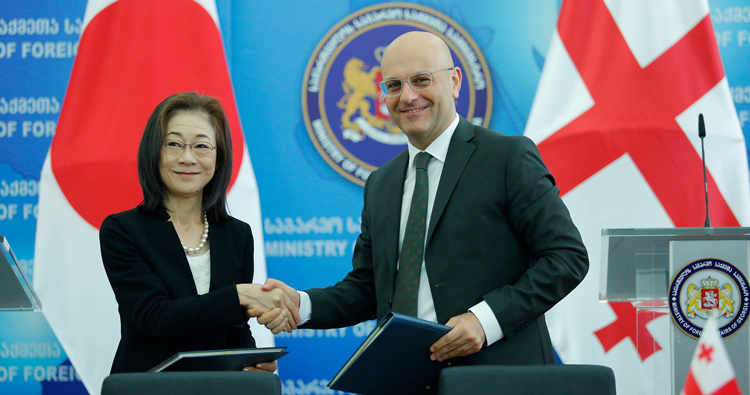Japan’s Caucasus Initiative:
How do Japan and Georgia plan to boost relations?

Japanese Minister of Foreign Affairs Taro Kono and Georgian Minister of Foreign Affairs David Zalkaliani. Photo: MFA of Georgia.

Japan and Georgia are joining forces to bring relations to a new level and after 26 years to refresh ties with a new initiatives, projects and ideas.
Japanese Minister of Foreign Affairs Taro Kono visited Georgia on September 4-5. This was Kono’s first visit to Georgia in the past 26 years of the diplomatic relationship.
The Foreign Minister said it took too long – 26 years, but we can utilise this moment and speed up the relationship” said Deputy Press Secretary Mitsuko Shino at the press conference yesterday, where she summed up Kono’s visit with local journalists, including Agenda.ge.
Shino said that Kono was happy to visit “your country because we see Georgia is our partner, who shares the common value of human rights, democracy, rule of law and freedom…The minister stated that Georgia is a front-runner of democracy, human rights and common shared values”.
Shino announced Japan’s Caucasus Initiative, which will involve two policy components –
providing assistance in human resource development state building and supporting infrastructure development and business environment improvement.
We have launched the Japan’s Caucasus Initiative, the basic principle of which is that Japan supports self-sustained developments of the Caucasus region. As you know Japan does not have any gas, no oil, and no rich natural resources. The only resources Japan has is human resources and that is somehow common to your country. We believe supporting self-sustained development is important in such a situation” Shino said.

At the end of the day honourable guests from Japan were invited at Mtatsminda Mount in Tbilisi. Photo: MFA of Georgia.
The self-sustained development involves two pillars. The first pillar is assistance for the development of architects for state building, which is assistance for the human resources development – human resources in the area of rule of law, environment disaster risk reduction, economic and social infrastructures and introduction of Japanese culture and assistance for Japanese language education.
Within this initiative we would like to invite young lawyers, or diplomats, or experts on investments and others to support your nation building up for the 21st century”, said Shino.
The second pillar is assistance for paving the way to ‘Appealing Caucasus’.
The Caucasus region is important for us in terms of its geographical location. It is for us a gateway or a bridge between Asia to Europe and furthermore to the Middle East. For us the stability of the Caucasus is not only in the interest of this region but also the stability of international society. We would like to support the stability of the Caucasus region”, Shino said.
 Japanese Foreign Minister also met President of Georgia yesterday and gave him birthday cake as part of Japanese tradition. Photo: President's press office.
Japanese Foreign Minister also met President of Georgia yesterday and gave him birthday cake as part of Japanese tradition. Photo: President's press office.
While talking about the initiatives planned within the second pillar Shino accented the importance of the introduction of multiple entrance visas.
We are introducing multiple entrance visas that are starting from October 1 [2018]. We will give multiple visas to short-term visitors to Japan that will encourage people-to-people visits to both sides. We are very careful in easing the visa requirements. That is being done step by step. This is a quite big step forward to a visa-free relationship. I know that Georgia has a visa-free system with the Schengen treaty countries and in order to make Georgia a gateway it is very important flr us to have a visa-free relationship”, Shino said.
The second pillar also includes the investment treaty which we have agreed on in principle and we really have to work on to make a concrete agreement. This would facilitate and promote the investment of Japanese companies in Georgia”, she added.
Another part that the second pillar includes is connectivity and transportation infrastructure.
Within this pillar Japan has already allocated $343 million to finance construction of the 14km long Shorapani-Argveti section of the East-West Highway, which is Georgia’s major transport artery.
 The deal was signed between Georgian Finance Minister and vice-president of Japan International Cooperation Agency (JICA) yesterday. Photo: Finance Ministry.
The deal was signed between Georgian Finance Minister and vice-president of Japan International Cooperation Agency (JICA) yesterday. Photo: Finance Ministry.
The East-West Highway will make logistics easier and will make Georgia and the Caucasus region more attractive for Japanese companies, because it will expand the market for companies who are going to invest here”, she said.
There are many starting points to connect two economies together”, continued Shino. “Like in Japan we organise Foodex, which is a food expo and Georgian companies are usual attendees. 16 to 20 companies are attending to Foodex and promoting Georgian wines in Japan. Also, an IT Week is planned in Japan and also tourist expo is planned in September-October and there are 10-12 Georgian companies that will attend these expos. These are concrete steps to get to know Georgian products and Georgian potential in person. And there is also Tochinoshin, the Georgian Sumo wrestler which had made the knowledge (of Georgia) among Japanese people quiet high. He is a big promoter of your country in Japan”, she said.
Furthermore, Georgia and Japan are about to start free trade negotiations as well. Georgian Prime Minister Mamuka Bakhtadze raised this issue at yesterday’s meeting with Kono.
 Japanese Foreign Minister and his wife left Georgia today. Photo: MFA of Georgia.
Japanese Foreign Minister and his wife left Georgia today. Photo: MFA of Georgia.
 Tweet
Tweet  Share
Share